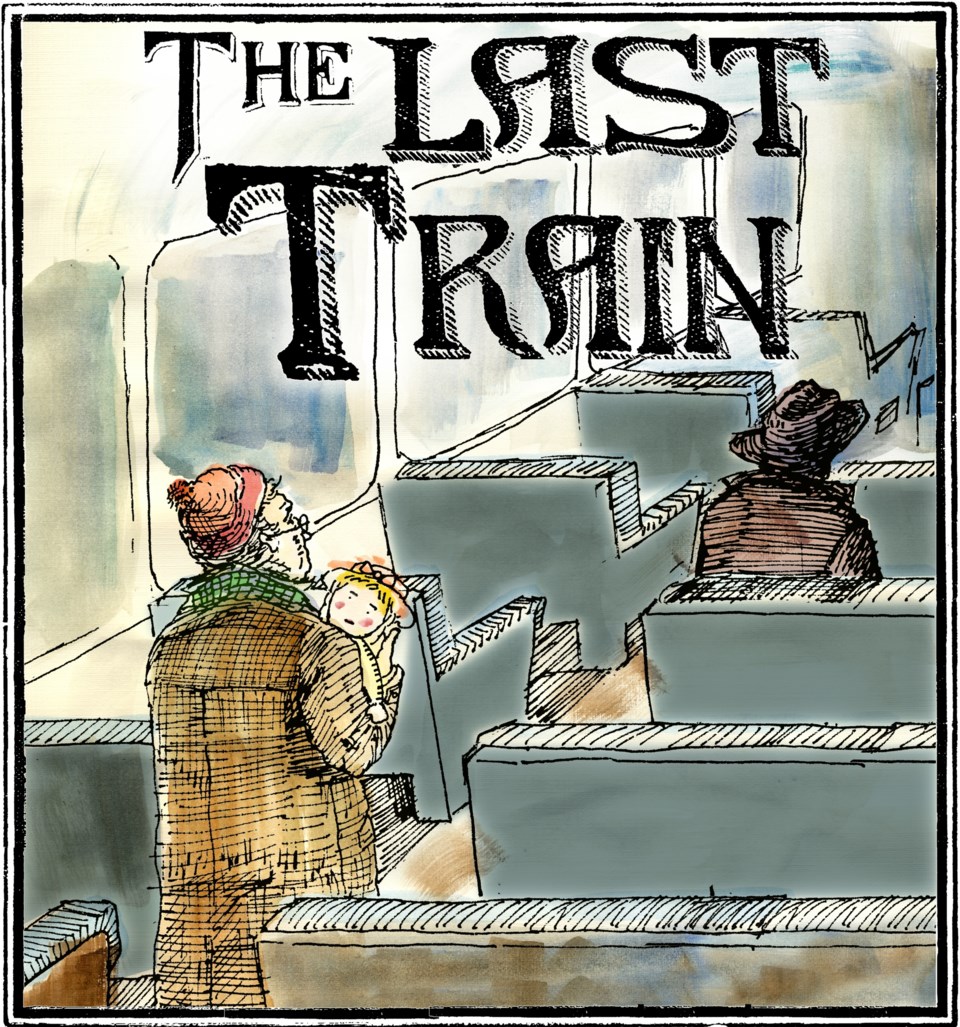New West writer JJ Lee, whose debut book, The Measure of a Man: The Story of a Father, a Son, and a Suit, was a shortlisted nominee for a Governor General’s Award and the Charles Taylor Prize, gives Record readers a present. He’s sharing his Christmas story, The Last Train, and he’s doing it, in part, to help raise funds for Qayqayt school’s playground. See the end of the story for more on how you can help.

Cheap Harry loved toys, not to play with, but to find and sell.
Cheap Harry was a picker, an expert appraiser, a ruthless trader of antiques and old things but it was toys he loved best.
For example, before the accident, he found at the Value Village a Ronin Warriors Giant Robot from Japan. It featured the infamous rocket fist. A little boy played with it while his mother tried on boots.
Cheap Harry sidled beside her and explained to the mother that in 1973 a Ronin Warriors rocket fist blinded a child and since then all Ronin Warriors had been recalled and banned.
The little boy cried as Cheap Harry peeled the shiny robot (mint condition) from his tiny hands.
That night Cheap Harry sold it online for $400. The buyer was a fifty-year-old Wisconsin man who owned the world’s largest collection of Ronin Warriors but only possessed one eye.
A few days after that incredibly lucrative sale Cheap Harry had the accident. It left his face scarred and he couldn’t stand bright lights. Even looking at a candle gave Cheap Harry vertigo.
For a year, he hid from all lights. He secluded himself in the attic of house that looked over the old commuter line and watched the trains come and go.
Then one morning, on Christmas Eve, a blizzard brought an eerie, apocalyptic darkness upon the world. The conditions were perfect for Cheap Harry. He would go outside for the first time in ages. He would take the train into the city. He would, once again, go out on the prowl, in search of toys.
•
Cheap Harry visited all his favourite haunts but as closing time neared he felt miserable.
As he came and went from shop to shop, no one said, “Hello,” or “Merry Christmas,” or “Where the hell have you been?” No one said nothing to him.
The store keepers, the other pickers and antique collectors, his rivals – some whom he had known for years – ignored Cheap Harry. They avoided looking at him. In fact, they went out of their way to look right through him.
Maybe he deserved it.
I wasn’t going to say anything but you should know among the memorabilia community Cheap Harry was notorious, dark legend. If you wanted to know the value of any object made in the last 200 years, Cheap Harry was the man to ask. Yet no one ever did. His fellow antiquarians deplored Cheap Harry because whenever a lucrative deal was made in Cheap Harry’s favour his face would contort into a triumphant leer.
It was the kind of leer that made you want to wash your hands. It was the kind of leer that let you know you had been cheated. It was a leer that sent shudders down people’s spines.
Cheap Harry, not the most sensitive man, was unaware of their professional disdain and he assumed the cold reception had to do with his poor disfigured face or bald jealousy. Cheap Harry was back in the hunt, on his game, making out like a bandit, and they didn’t like it.
•
Christmas Eve was turning out be, instead of his triumphant return to action, a long, lonely slog. At the end of the day, with the shops beginning to close, and people rushing home in the storm to be with family, Cheap Harry decided to slink into one final place, a messy thrift store near the tracks, and it was there that he found his treasure.
The toy, Cheap Harry’s “score” – this is what he liked to call them – was a stunning plaything from the yesteryear of childhood.
All he needed to do was catch the last train home, log online, and post it for sale. Within days, maybe even hours, he would have his money.
His gloomy mood forgotten, Cheap Harry muttered, “Be there, be there, be there,” as he crossed the station lobby and strode up to the platform.
It was dark and desolate.
Cheap Harry looked at his watch. He shook it. He put it to his ear. Since the accident, it was always stopping.
“I’ve missed it.” He cursed.
Then, a gust swirled crystals around him and he cowered.
“There’ll be one last train.”
Cheap Harry turned. There stood a man in a fedora.
“We will have it to ourselves,” said the man.
Out of the black, through the drifts, plowed an black engine.
They boarded an empty car. The man took a seat by a window. Cheap Harry took one two rows behind.
Cheap Harry was drawn to the stranger but he knew not why. The man appeared young but he felt old. The fedora was old and expensive. It was made of real beaver felt. The man’s coat was old too, an army main coat, wool, very vintage, probably Burberry, most likely from the First World War, in astonishing condition. Cheap Harry guessed he could have sold it for $700 on eBay.
As Cheap Harry appraised the stranger, an overwhelming anxiety gripped Cheap Harry. He felt sure the toy, his find, his treasure, was no longer in his bag.
Cheap Harry reached in and pulled out a French porcelain doll. The hair, the painted eyes, the lips, all perfect.
Cheap Harry had already given her a name: Little Miss Profit.
She was a total steal. Literally. Cheap Harry stole her. He had ripped off the tag and walked up to the dimwitted boy at the register. Cheap Harry stood and waited and waited but the boy was entranced by his phone. Frustrated, he slammed his hand on the counter. Startled, the boy gaped at the doll but refused to look at Cheap Harry’s scarred face. A wind blew open the shop doors and, with the toy, Cheap Harry had stormed out.
“Is that for your girl,” said the man on the train.
Cheap Harry glanced up. The man had swung his left arm over the seat between them. On his wrist glinted a watch. Cheap Harry barely suppressed a gasp. He had to have a closer look.
“May I see the time,” asked Cheap Harry.
The man lifted his arm. It was a Rolex trench watch from the First World War. It had a silver shroud, a black face and luminous numbers. Unscratched. Mint. It belonged in a vault.
“Where did you get that,” stammered Cheap Harry.
“Years ago. At Harrod’s. I paid four pounds, an extravagance, but my mother and her friends insisted. They sent the money to me when I was overseas.”
“Four pounds is hardly an extravagance for such a fine instrument,” said Cheap Harry.
“It keeps time, sir. My name is Dunphy. George Dunphy.”
Cheap Harry found the man’s extended hand cold as ice.
“Do you have a girl, Mr. Dunphy?”
“Yes, Mr. Harry. Her name is Francine.”
“I imagine Francine likes dolls?”
“Yes, Mr. Harry. When she was a baby, she looked like the very doll you are holding.”
“Well, then, she must be very beautiful.”
“Indeed, I would do anything for her, Mr. Harry.”
In those words, Cheap Harry detected in Dunphy hunger, despair, exhaustion. With anyone else Dunphy would have elicited pity but Cheap Harry only felt the urge to pounce.
“Will she find a doll like this one under the tree?”
“No, I’m afraid not,” said Dunphy. “My … circumstance prevents me from obtaining one.”
“Of course, they’re very rare. But your daughter, she wants a doll exactly like this one, I mean, what little girl wouldn’t?”
“Indeed, Mr. Harry.”
“It occurs to me, Mr. Dunphy, what if I propose a trade? Your watch for my doll?”
“You would trade with me? I have spent ages seeking such a toy, Mr. Harry. And because of my current state, well, Francine has been disappointed over the years. A trade would make my family’s Christmas finally complete.”
“Why not?” said Cheap Harry. “It’s Christmas.”
Again they shook hands and Dunphy invited Cheap Harry to dinner with his family. Despite himself, Cheap Harry agreed.
Dunphy got off at Cheap Harry’s station and led him to the other side of the tracks. Tucked behind a stand of trees, there was a small cottage. Smoke rose from its stack. Warmth glowed from the windows. Cheap Harry panicked.
“Mr. Dunphy, I’m sorry. I don’t want to intrude. My apologies. I have business to attend to.”
“Mr. Harry, what business could you have? It’s Christmas Eve.”
Cheap Harry snapped, “I actually do have business, Mr. Dunphy. You see, the watch you have given me. You don’t know what it is worth do you? Well, I plan to sell it for $7,000. And the doll you wish for your daughter to PLAY with, it’s worth $3,000 until your daughter cuts its hair or spills tea on it. Then it will be worth next to nothing. So you see, I do have business Mr. Dunphy. Merry Christmas.”
Cheap Harry walked away and thought about how Dunphy was an ignorant fool. Cheap Harry had the full value of the watch, a rare museum-quality artifact but Dunphy wore it on his wrist.
What if Dunphy had more? What if Dunphy had an entire home filled with under-valued treasures, ready for the taking.
Cheap Harry crept to the Dunphys window. Standing by the fireplace, cradling the doll, was the girl. Dunphy and his wife sat in tattered chairs, basking in the child’s joy. Francine – was that her name? – looked just like the doll. No. Like an angel.
And this thought shot through Cheap Harry’s soul like a little red rocket fist. He now only wanted to watch the girl play.
Cheap Harry knocked on the door. No one answered. He went to tap on the window. As he raised his arm, a horror unfolded.
The fire caught the girl as if she were dipped in oil, then it claimed Dunphy and his wife. None moved but their shadows danced.
Cheap Harry banged at the window but it would not break. He kicked at the door. It was nailed shut.
He ran into the street yelling, “Fire, fire, fire.”
People stood about, holding up their damn phones.
He tried to grab a woman and rouse her into helping the poor family but he could not form a grip. His hands were insubstantial as the smoke.
“Good riddance to an eyesore,” said the woman.
“They should have knocked it down years ago,” said a neighbour.
“It was a hazard. A derelict,” another agreed.
Cheap Harry watched the fire engulf the long-abandoned house.
It burned bright red, then pure white. Cheap Harry felt vertigo. Then from its heart emerged Francine, holding the doll.
She smiled at the silly old ghost and beckoned.
Finally, he understood.
Cheap Harry dropped the watch in the ash and snow and followed Francine into the shimmering afterlight.
If you liked JJ Lee’s story about giving children the gift of play, JJ encourages you to support École Qayqayt Elementary School’s parent advisory council and their campaign to build a school playground. To make a donation by credit card or cheque, email them, 2qqpac@gmail.com. They’ll get in touch. They’re really nice people.



